March is Women’s History Month, and Coastal Carolina University’s history is rich with strong and impactful women who have helped build this University from the ground up. To recognize and honor their contributions to this institution, region and state, we will highlight some of these women throughout the month of March!
Sydney Madden
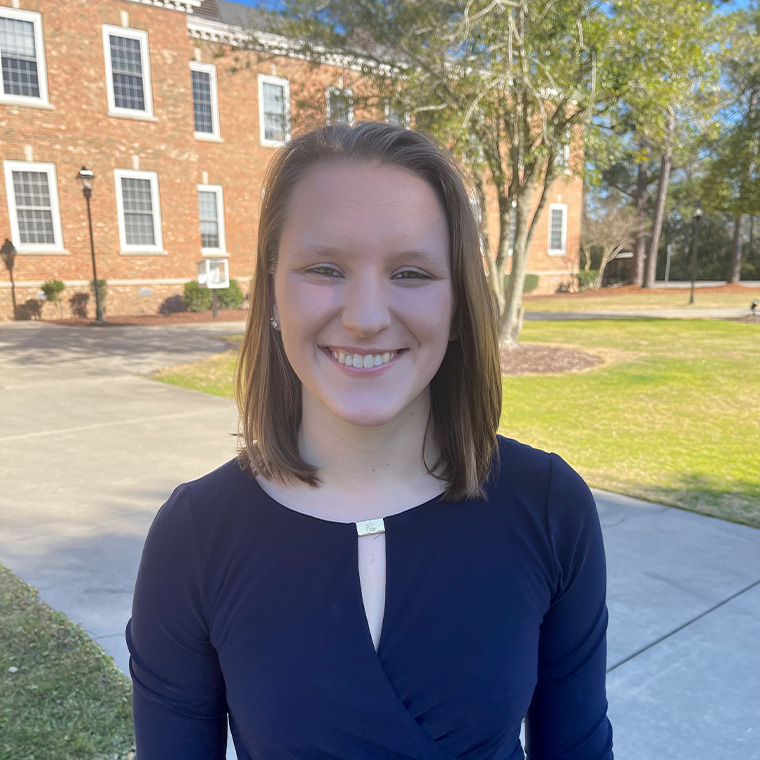
CCU graduate Sydney Madden earns Fulbright program award
Coastal Carolina University alumna Sydney Madden was recently named a 2023-24 Fulbright U.S. Program Student. For 10 months, beginning in March 2024, Madden will conduct research with the Discovery Bay Marine Lab (DBML) team at the University of the West Indies in Jamaica. Her project focuses on monitoring, fragmentation, and restoration of the EcoReef, Discovery Bay’s artificial reef.
Read the full news story »
Sanaa Chambers
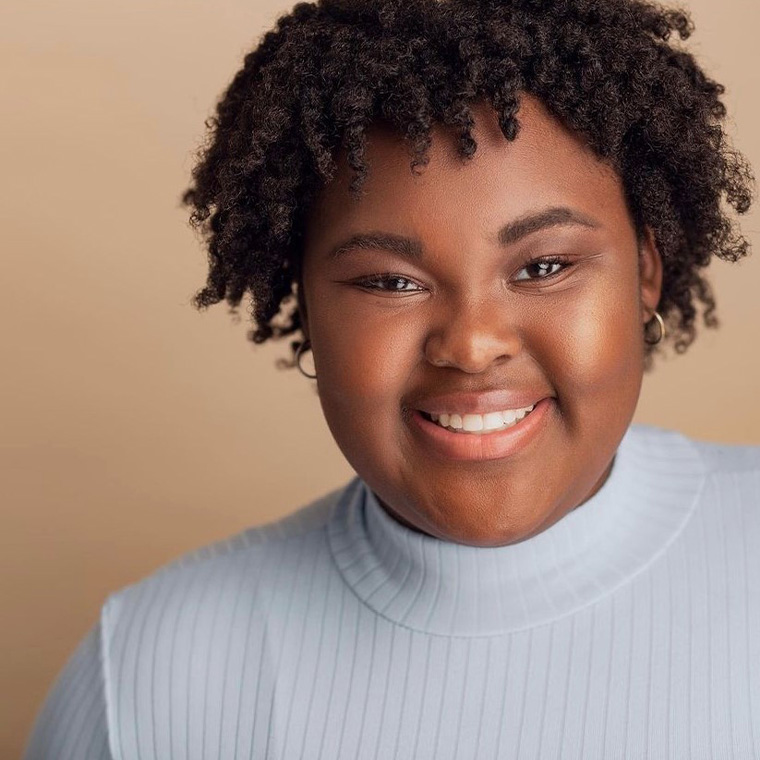
CCU student Sanaa Chambers awarded scholarship to study in Italy
Sanaa Chambers, a Coastal Carolina University sophomore theatre arts major with a physical theatre concentration, will study in Arezzo, Italy, during the 2023-2024 academic year with the assistance of a $10,000 NAFSA Tamara H. Bryant Memorial Scholarship Award from the Fund for Education Abroad (FEA) and NAFSA: Association of International Educators. The endowed scholarship was established in 2019 to provide study abroad opportunities for African-American undergraduate students.
Read the full news story »
Amira Hanafi
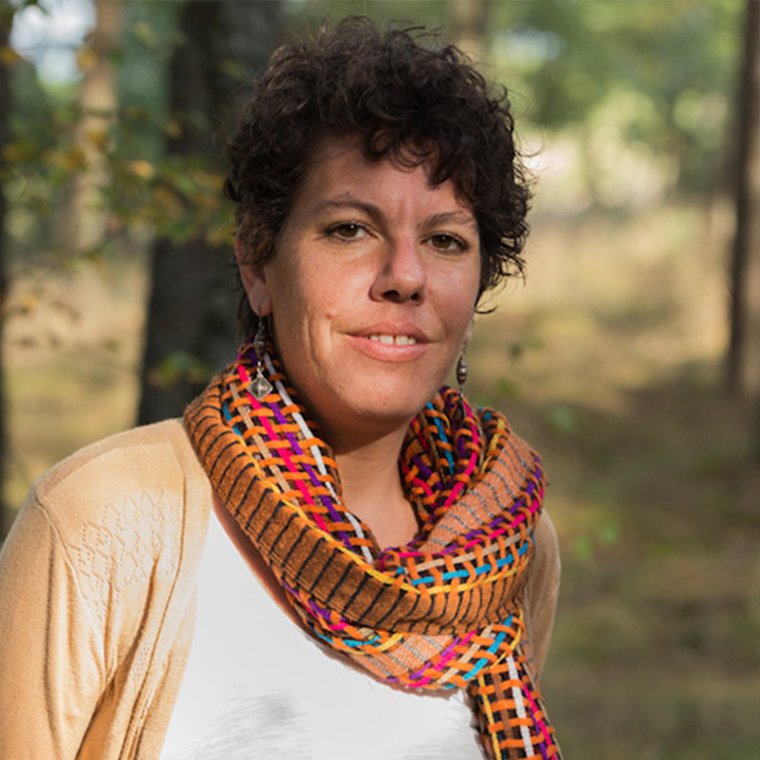
CCU faculty member Amira Hanafi wins ArtFields grand prize with digital artwork
Coastal Carolina University writer-in-residence Amira Hanafi is living evidence that traditional artistic genres are not only flexible, but boundless; for example, poetry is art, and art, poetry. Hanafi has long operated on this principle and taught it in her writing classes, yet her accomplishment at ArtFields, a regional art competition held annually in Lake City, S.C., has reinforced the concept and solidified it within a broader public. Hanafi’s interactive digital artwork, titled “Mexicans in Canada,” recently won the grand prize at the 2023 event and brings with it an award of $50,000. This is the first year a digital piece has claimed the top prize at ArtFields.
Read the full news story »
WOMEN'S & GENDER STUDIES (WGS) PROGRAM
Additional Information
- What To Do With a Women's and Gender Studies Degree
- Minor in Women's and Gender Studies
- Event Schedule
- Resources
The Women's and Gender Studies (WGS) Program at Coastal Carolina University is dedicated to the interdisciplinary study of gender and its intersections with other identity markers such as sexuality, race, class, nationality, and ability/ disability as economic, political, and cultural constructs. It celebrates diversity, acknowledges women’s accomplishments, conditions, and contributions, and highlights the ideologies implicit in women’s places in societies both in the U.S. and internationally.
Events:
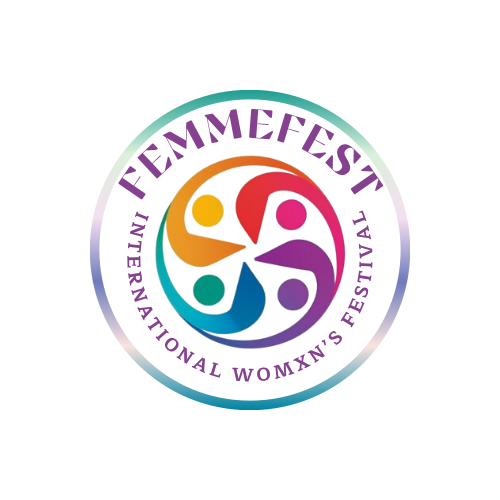
FemmeFest / International Womxn’s Festival Calendar of Events
FemmeFest / International Womxn’s Festival strives to create a platform for interweaving lectures, panels, exhibitions, concerts, performances, and educational experiences centered in intersectional gender justice principles and in celebrating and lifting up the voices of historically marginalized communities, such as women of color a well as trans* and non-binary people.
FemmeFest is made possible thanks to a Belong @ Coastal Inclusive Excellence Grant and the Women’s and Gender Studies Program
Monday, March 11th
Women’s History Month Faculty Exhibit – Kimbel Library (through the end of the month)
"Women at CCU, in SC, and the World" Display – Prince Lawn (through the end of the month)
Artist Colleen Toledano's "When the Obscure is Clear" exhibit – Rebecca Randall Bryan Gallery (through the end of the month) [Toledano's collection presents autobiographic ceramics that explore notions of family, motherhood, and domestic relations]
Tuesday, March 12th
What Were You Wearing Exhibit @ 4:00pm – LJSU Rotunda (through March 19)
Wednesday, March 13th
Erasure Poetry Workshop with Jess Hylton @ 2:00pm – EHFA 165
Thursday, March 14th
Consent & Intimacy Best Practices Workshop with Echo & Dory Sibley @ 10:50am-12:05pm – Prince 102
Artist Lecture with Colleen Toledano, "When the Obscure is Clear" @ 4:30pm – Rebecca Randall Bryan Gallery
Women From Mars Presents: SILENT REFLECTIONS: A Clown Noir Cabaret @ 7:30pm – Wheelwright Auditorium – Tickets [Proceeds will support future WGS programming]
Friday, March 15th
FemmeFest Kickoff & International Women’s Day Festival @ 12:00pm-5:00pm – Prince Lawn [Meet and mingle with on-campus and off-campus vendors and organizations]
Hats off to Women Award Luncheon (sponsored by IISS) @ 11:00am-1:00pm – Allen Ballroom (SNGL 129) – RSVP
FemmeFest Kickoff Keynote with Jess Hylton & Guest Speakers @ 4:30pm – Prince Lawn
Amanda Harberg Pre-concert Reception @ 5:00pm – Edwards Courtyard
Amanda Harberg in Concert Sponsored by the Department of Music and the REPRESENTATOIRE Project @ 6:00pm – Edwards Recital Hall (EHFA 152) – Tickets
Three Sisters presented by the Department of Theatre @ 7:30pm – Edwards Blackbox – Tickets
Saturday, March 16th
Brunch 'n Bling Extravaganza sponsored by IISS and PRIDE @ 11:00am-2pm – West Zone Suites at Brooks Stadium [Brunch begins at 11am with performances starting at noon.]
Bottoms Film Screening & Post-show Panel @ 6:00pm – LJSU Coastal Theater
Three Sisters presented by the Department of Theatre @ 2:00pm & 7:30pm – Edwards Blackbox – Tickets
Sunday, March 17th
Three Sisters presented by the Department of Theatre @ 2:00pm – Edwards Blackbox – Tickets
Tuesday, March 19th
Student Symposium: Multimodal Projects about Intersectionality with Digital Culture & Design from 10:50am - 12:05pm – LJSU A201 [A symposium featuring student speakers showcasing their multimodal projects that explore intersectionality in the media, entertainment, sports, culture, politics, and more]
"Chemical Diasporas: The Kinship and Afterlives of Agent Orange," a talk with Natalie Duong @ 12:15pm – Wall 116 [This talk addresses the concept of a chemical diaspora as a network of harm but also a source of political solidarity that connects populations exposed to herbicides. This talk is possible thanks to SC Women in Higher Education.]
"Choreo/cartographies: Mapping Research across Disciplines," a workshop with Natalie Duong @ 1:40pm-3:10pm – HTC 141 [This workshop investigates alternate ways of mapping space as a form of embodied research and resistance. No prior dance or movement experience required; please dress in clothes that allow you to move comfortably.]
Takeover Tuesday with SAGE x CHROMA [Yarn Bombing Workshop] @ 6:30pm – KRNS 110
Wednesday, March 20th
Women’s History Month Trivia Night @ 6:00pm – LJSU A201 [Gather for food and test your knowledge of women’s history to earn prizes]
Thursday, March 21st
Jackson Scholar Lecture with Serene Khader "What's Wrong with White Feminism?" @ 4:30pm – Johnson Auditorium (Wall 116)
Three Sisters presented by the Department of Theatre @ 7:30pm – Edwards Blackbox – Tickets
Friday, March 22nd
Guest Poets Presentation in collaboration with Social Justice Research Initiative @ 1:00pm – Edwards Blackbox (Department of Theatre Common Hour)
"Femme Fusion: Speaking Truth to Power by Uniting Womxn's Voices through Poetry" in collaboration with Social Justice Research Initiative @ 6:00pm – LJSU Coastal Theater
Students Advocating Gender Equality's (SAGE) Second Chance Prom @ 6:00pm – Allen Ballroom (SNGL 129)
Three Sisters presented by the Department of Theatre @ 7:30pm – Edwards Blackbox – Tickets
Saturday, March 23rd
Three Sisters presented by the Department of Theatre @ 7:30pm – Edwards Blackbox – Tickets
Sunday, March 24th
Three Sisters presented by the Department of Theatre @ 2:00pm – Edwards Blackbox – Tickets
Tuesday, March 26th
Salary Negotiation Workshop @ 3:00-5:00pm – KRNS 108 [learn about the gender wage gap and effective techniques to negotiate your salary]
Student Symposium: Data-driven Storytelling about Mental Health with Digital Culture & Design @ 4:00pm – Alford Ballroom (ANTM 105) [A symposium featuring student speakers showcasing their data-driven stories that explore mental health impacts of social media, competitive dance, and LGBT+ folks’ relationships to religious communities]
Story Circles, Performance, & Activism Workshop with Amanda Masterpaul @ 5:30pm – Allen Ballroom (SNGL 129)
Wednesday, March 27th
Madan Sara - The Power of Haitian Women Film Screening @ 5:30pm – LJSU Coastal Theater
Thursday, March 28th
Transgender Day of Visibility Panel in collaboration with Social Justice Research Initiative @ 5:00pm – BRTH 101
Friday, March 29th
Performance Art in Community Student Exhibition @ 6:00pm – Fresh Brewed Coffee House (933 Broadway Street, Myrtle Beach) – Tickets
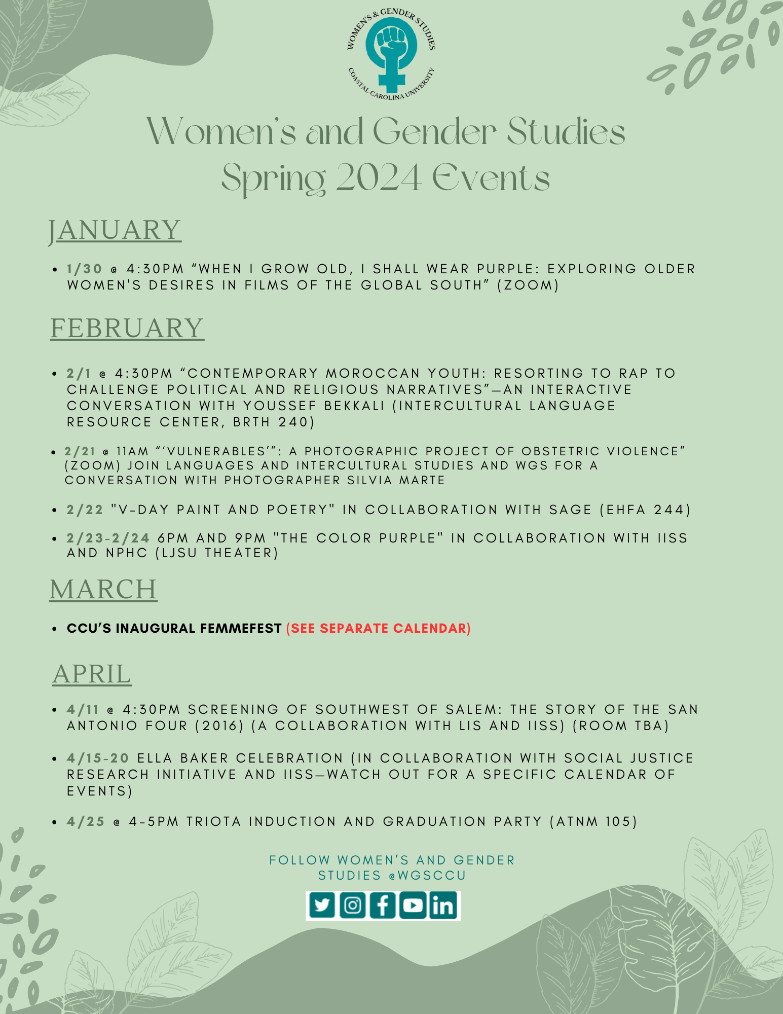
CCU FACTS
First female faculty member
Hired in 1954. Margaret K. Woodhouse Ph.D., taught history and English. She earned $4,500 for the 1954-1955 academic year.
First women's group
The first women’s group on campus was the Anchor Club, started in 1957.
First librarian
Catherine H. Lewis built the library collection in 1958.
First female graduates
Emmaline Burroughs Cannon and Sara Lynn Singleton. The first CCU commencement was held in May of 1959.
First female four-year graduate
Joann Wiegand.
First black female four-year graduates
Linda Bratcher and Pat Singleton.
First female Vice President
Sally Horner.
Women's Studies established
The Women's Studies (later renamed Women's and Gender Studies) minor was officially created in 2002. The first directors of the program were Nelljean Rice and Preston McKever Floyd.
First CCU Olympian
In 2008, Amber Campbell became the CCU's first Olympian, competing in the hammer throw. She has since competed in the 2012 and 2016 Games. Her highest finish was sixth in 2016.
First African-American Female Dean
Dr. Dianne Mark is hired as Dean of the Spadoni College of Education.
B.A./B.S. in WGS Established
Board of Trustees approves a B.A./B.S. in Women’s and Gender Studies.





